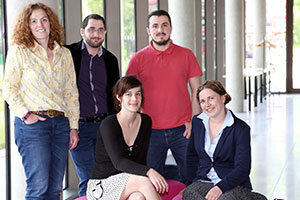
(standing) Dr Louise Beard, Hussam Krkjie, and Abdul Razouk, (seated) Goedele Caluwé and Roxana-Diana Baltaru
Innovative teachers, with a passion for inspiring students, will be rewarded at the 2016 University of Essex Graduation ceremonies next month when they collect Excellence in Teaching Awards.
Five graduate teachers and two experienced lecturers will be recognised for their imagination and vision, which helps give Essex students a transformative educational experience, at the ceremonies on 12, 13, 14 and 15 July.
Those collecting Graduate Teaching Awards are:
Roxana-Diana Baltaru is inspired by her second-year students who she teaches in the Department of Sociology, focusing on using quantitative and qualitative methods for research. She believes a great teacher has to be able to “walk in the students’ shoes” as well as be able to convey “complex information into simple words”. She said: “We are all scientists in the process of ‘finding things out’ about the world. My job is to help students recognise scientific reasoning in everyday life and help them translate that realisation into expert language.”
Goedele Caluwé learnt a lot about good teaching from her colleagues in the School of Philosophy and Art History where she has taught several modules to undergraduate students. She said: “I try not so much to be a teacher, as to be a student, thinking and discovering with my students. I want them to feel comfortable to speak up. I constantly encourage them to be thinking, and challenge them to question their own views.” Goedele, who plans to continue teaching and conducting research, has been experimenting with new teaching approaches such as making classes more interactive by asking students to draw schematic representations of lecture material. She added: “I’ve also been conscious about how students learn in different ways, so have been trying to think more about visual learning.”
Hussam Krkjie found inspiration from the distinctive style of teaching of former Essex Business School colleague Patrick Hitchen. Hussam works across the Colchester and Southend campuses, teaching several managing and marketing modules. He believes the key to great teaching is flexibility: “Flexibility means adjusting your teaching style to satisfy students’ needs, to find the way to motivate them to engage in the class, and to meet the module objectives.” Hussam also believes it’s important in business studies to link theories with practices: “A teacher should understand what businesses and organisations do in the real world.” He plans to further his skills through the CADENZA professional development programme and hopes to explore opportunities to use drama techniques in business teaching.
Naseem Ramli helps undergraduates in the School of Computer Science and Electronic Engineering develop key mathematical skills that can be applied throughout engineering. She uses software simulation and hardware implementation tools to help engage her students, and believes in approaching each student as an individual. She believes “good teachers are very hard working, putting a huge effort into preparing lessons, marking work and giving extra time to students who need it.” Her inspiration is her father, a civil engineering professor with over 20 years’ experience: “His way of teaching is very effective, passionate and scrupulous. He uses new, state-of-the-art software technology to support his teaching activities. He is an exemplary figure to me.”
Abdul Razouk uses a dramatic approach to his teaching in the Department of Government and Essex Business School: “I consider my classes as a theatre, not another lecture, where different actors, including myself, are playing different roles to perform educational plays. It creates a learning experience through which actors learn from each other’s experiences using open dialogues.” He believes that a great teacher needs more than just qualifications: “What makes someone a great teacher is their ability to inspire students and uncover hidden treasures and possibilities before their eyes…someone who has the ability to bridge gaps, build relationships, to encourage collaborative authorship and to cultivate an interactive environment in which students can express themselves freely.”
Experienced Awards will go to:
Dr Louise Beard from the School of Biological Sciences draws inspiration from her own students: “I love to see the ‘light bulb moment’ when my explanation of a complex scientific topic is understood. Keeping in touch with ex-students and hearing about their achievements, and how important their university education was is also inspiring.” In her teaching Dr Beard uses technology to engage and motivate her students, embracing online platforms to assign coursework, a phone app to support revision, response clickers to keep students engaged in class, and clicker quizzes instead of worksheets to assess understanding. She said: “Teachers are always learning too, and I have taken this approach in my own teaching, always looking for ways to improve by acting on feedback.” Dr Beard’s own student experience has also provided inspiration: “When I was at university, no lecturers knew my name for the whole duration of my degree and I felt invisible. I don’t want any students at Essex to feel like that.”
Dr Valerie Gladwell who teaches sports science and biomedical sciences modules believes that teaching shouldn’t be all about the grades: “To be a great teacher you should not be just focused on the goal of getting students to pass the exam but ensure that they are challenged in many different ways, not just intellectually, which will put them out of their comfort zone and will not necessarily make you the most popular teacher.” She employs techniques such as Dragon’s Den-style panels for student presentations, and professional-standard client reports, to give students extra skills that she believes will set them apart when they are looking for jobs. Despite also being a researcher, Dr Gladwell is passionate about teaching, she said: “I will endeavour to ensure that my modules are interesting, engaging but also challenging. I think it is vital that the education part of an academic’s role receives the same recognition as research.”